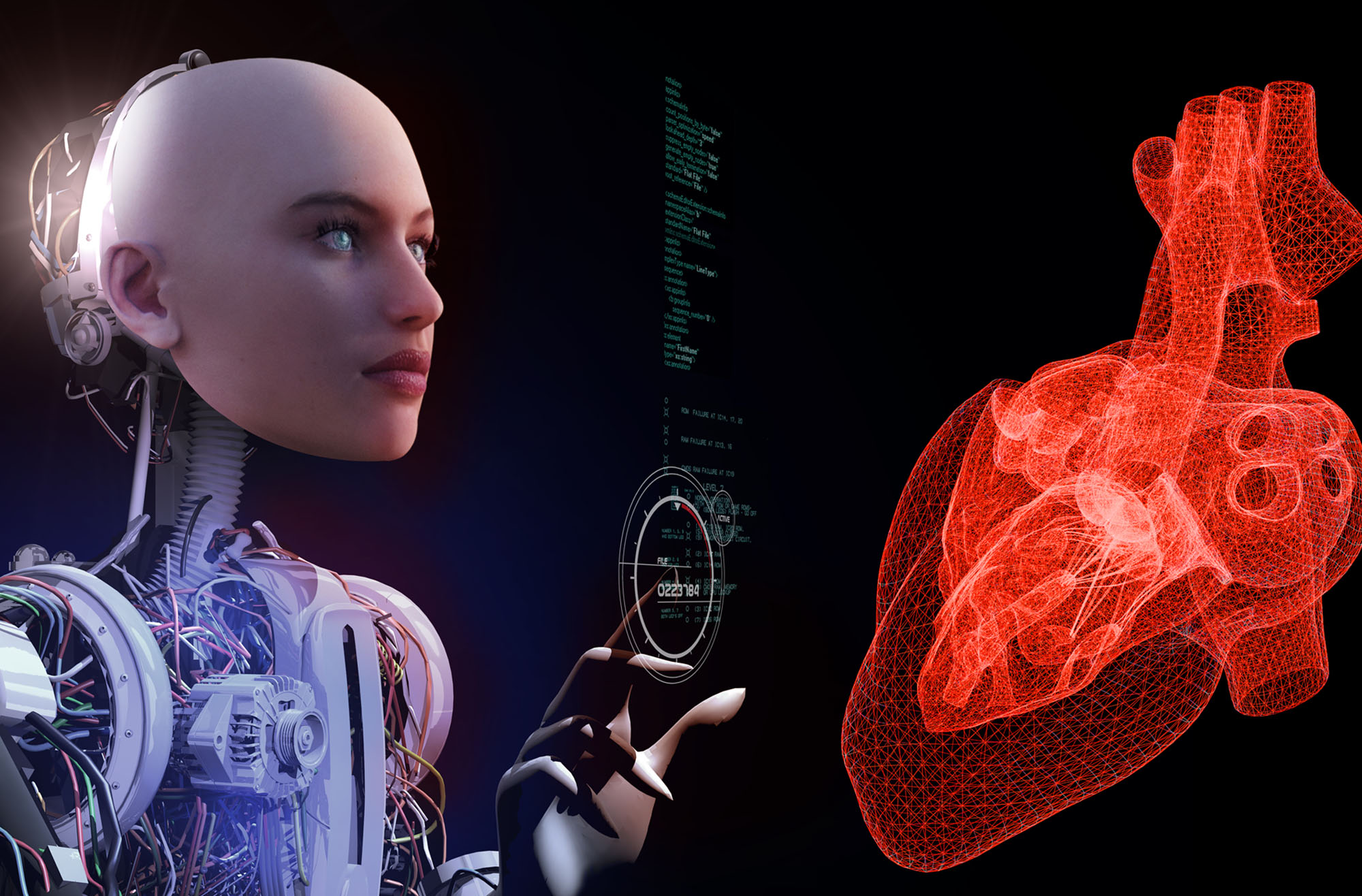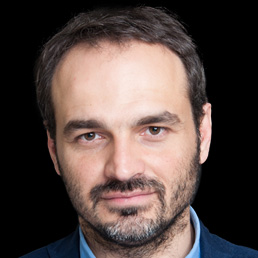Humantech Meetings: Technologiczne i etyczne aspekty sztucznej inteligencji

Rozwiązania w obszarze sztucznej inteligencji wydają się tajemnicze, choć jednocześnie wzbudzają podziw i obawy. Dlatego warto poznawać tę tematykę. Podczas kolejnego spotkania HumanTech Meetings będzie okazja dowiedzieć się czym jest uczenie maszynowe (machine learning) czy przetwarzanie języka naturalnego (NLP - natural language processing). Poznamy również regulacje prawne oraz kwestie społecznej percepcji sztucznej inteligencji. Dowiemy się też jak zmieni się rynek pracy.
Język wydarzenia: angielski z tłumaczeniem na język polski. Wstęp wolny
HumanTech Meetings
Żyjemy w erze innowacji, postępu technologicznego i cyfryzacji. Na całym świecie rozwijają się startupy, działy R&D, inkubatory innowacji, akceleratory, fundusze inwestycyjne oraz platformy crowdfundingowe. Wszyscy chcą sprostać ludzkim potrzebom (czy też wykreować nowe) i szybko zaistnieć na rynku. Współczesny pęd do innowacji może powodować trudne do przewidzenia skutki psychologiczne i społeczne. Dlatego tak ważne jest nawiązywanie współpracy pomiędzy inżynierami, programistami, specjalistami IT oraz przedstawicielami nauk społecznych już na wstępnym etapie opracowywania nowej technologii lub usługi. To nie tylko daje szansę na uniknięcie błędów, lecz także umożliwia rozwinięcie innowacyjnego pomysłu.
– Nasze doświadczenia we współpracy z zewnętrznymi partnerami technologicznymi pokazały nam, jak różne mamy spojrzenia i jak bardzo możemy się uzupełniać. Wierzymy również w siłę łączenia perspektywy krajowej i zagranicznej. To skłoniło nas do stworzenia międzynarodowego forum wymiany myśli, które pozwoli wykorzystać lepiej potencjał badaczy nauk społecznych oraz twórców technologii – dr Konrad Maj, kierownik Centrum Innowacji Społecznych i Technologicznych HumanTech Uniwersytetu SWPS.
HumanTech Meetings to projekt Centrum Innowacji HumanTech, którego celem jest zbliżenie technologii i nauk społecznych oraz spojrzenie z różnych perspektyw na takie zjawiska, jak sztuczna inteligencja, uczenie maszynowe, algorytmy, robotyka oraz wirtualna i rozszerzona rzeczywistość.
Więcej informacji »
Lectures - Part 1
16:45 - 18:30
Lecture 1: AI Ethics in Regulatory Landscape (16:45-17:15)
Dr. Szymański will focus on the social perception of Artificial Intelligence (AI), its ethical implications, and he will discuss the landscape of ethical regulations related to AI. There are three models of regulation in the current approach to ethical AI: top-down regulation, bottom-up (self-regulation) and middle-out (top-down framework for self-regulation at different levels). Dr. Szymański will briefly characterize the most important AI regulatory initiatives and will mention the current status of AI ethical regulations in the European Union. He will present the main challenges associated with these regulations, such as algorithmic accountability, data bias, algorithmic bias, transparency, AI explicability, and AI governance and he will also indicate the ethical risks associated with these issues.

Dr. Sebastian Szymański – Philosopher specializing in ethics and practical ethics. His research interests focus on justice and ethical problems related to new technologies, in particular robotization and Artificial Intelligence. He teaches roboethics and ethics of new technologies at the Faculty of Artes Liberales and is a member of Laboratorium Techno-Humanistyki [Techno-Humanities Laboratory], at the University of Warsaw. He leads an ethics group in the expert team by the Ministry of Digital Affairs of the Republic of Poland, which is responsible for the development of the Polish Artificial Intelligence strategy. Additionally, he sits on the Digitization Council at the Ministry of Digital Affairs, where he heads its Artificial Intelligence team. His most recent publication is entitled Uzasadnienia teorii sprawiedliwości. Dziedzictwo Johna Rawlsa [Justification of the Theory of Justice. The Legacy of John Rawls] (published by Wydawnictwo Naukowe Scholar: 2018). Dr. Szymański is currently working on a book about AI ethics, which is scheduled for publication by Wydawnictwo Naukowe PWN in 2020.
Lecture 2: The Ethics of Artificial Intelligence: A Technological and Social Challenge (17:15-17:45)
The presentation will explore the issue of ethics in relation to Artificial Intelligence. Dr. Madei will give examples of areas where machine learning and artificial intelligence pose ethical challenges. Additionally, he will emphasize that applications of AI lead not only to technological, but also to social challenges. Dr. Madei will propose that AI can be used for the greater good of all people only, if we apply an interdisciplinary approach to its implementations.

Vince Madai, M.D., Ph.D. – Vince Madei is a senior medical AI researcher at Charité University Hospital Berlin and CSO at ai4medicine. He holds an M.D., a Ph.D. in Medical Neuroscience and an M.A. degree in Medical Ethics. Additionally, he has completed an Udacity Nanodegree in data science and analysis. His professional interests include AI-research, AI-ethics, data science, post-processing of neuroimaging and clinical research. He has been the scientific lead of the “Predictive Modelling in Medicine” research group at Charité as well as the Prediction2020 and the PRECISE4Q projects for the last two years. He is an expert in AI ethics, specializing in bias and upcoming regulations for AI products. Moreover, he is on the expert council of the Good Technology Collective (GTC) and Associate Editor of an interdisciplinary publication Delphi Journal. Since November 2017, he has been the main organizer of the “Machine Learning in Healthcare” meetup in Berlin.
Lectures - Part 2
18:45 - 20:30
Lecture 1: Programs Creating Programs: How AI Technology Impacts IT Professionals
Machine Learning technologies or broadly understood AI support the development and improvements of computer software. Currently, the job market in the IT industry is a typical ‘employee market’, forcing employers to constantly compete for best talent and specialists. This leads to a development of a specific organizational culture involving a creation of an attractive place of work for engineers. Will this trend change with a ubiquitous application of AI? Do employees in the technology sector feel threatened? The presenter will talk about practical applications of AI in organizations. The lecture will also show examples of changes happening in some companies and changing behavior of employees faced with technological developments.

Łukasz Bargiełowski – holds a Master’s degree in management from the Warsaw Management University. He also completed postgraduate studies in cybersecurity at the Warsaw School of Computer Science. He also is a certified Agile Service Manager/SCRUM Master. For over 14 years, he has been leading teams of engineers in technology companies. He helped to establish and develop Technical Centers in Warsaw, employing programmers and help desk engineers for clients such as Symantec and F5 Networks. In his professional career, he specializes in teaching communication skills for engineers, focusing on relationships with external clients. He often gets involved personally in solving client-related crisis situations. This allows him to closely observe the work of highly skilled technical experts, representing a cool and collected technical approach in confrontation with emotional clients dealing with a technical breakdown. His other interests include organizational culture in technology companies and its impact on employees and on the job market.
Lecture 2: Recent Advances in Natural Language Processing (NLP)
"Mastery of language affords one remarkable opportunities” (Alexandre Dumas). While the mastery of language has been solely owned by humans so far, this seems to be changing these days. Thanks to drastic improvements in the field of NLP, neural networks become better and better in understanding and generating language. This talk will introduce you to "Transfer Learning", a core technology behind modern NLP models that has empowered many of the recent breakthroughs. With two exemplary applications (Question Answering & Fake News Generation), we will demonstrate not only the remarkable opportunities of NLP models, but also the risks and responsibilities that arise from the use of this new technology.

Malte Pietsch – is Co-founder of deepset, where he bridges the gap between Neuro Linguistic Programming (NLP) research and industry, by providing open-source software and developing custom NLP models. He has developed NLP systems for diverse clients, such as Siemens, Airbus and Springer Nature. He is an active open-source contributor and creator of the NLP packages FARM and haystack, which are in line with his biggest interests these days, such as: Transfer Learning, Language Models and the application to Question Answering. He graduated with honors from the Technical University of Munich with a M.Sc. degree and conducted research at Carnegie Mellon University. Before founding deepset he worked as a data scientist for multiple startups.
Meeting Host

Konrad Maj, Ph.D. – Social psychologist, Head of the HumanTech Meetings project, initiator and Head of the HumanTech Center for Social and Technological Innovations. In his research and teaching he focuses on social influence, media psychology and innovations. Recently, he has been working on a Human-Robot-Interaction (HRI) project. From 2013 to 2016 he held the post of Rector’s Representative for Research, focusing on practical application of research results and social innovations. He visited numerous innovation centers, including the Institute for Social Innovation (ISI) at Carnegie Mellon University, Pittsburgh, USA, the ID+ Research Institute for Design, Media and Culture at the University of Averio, Portugal, and Design Factory at Aalto University, in Finland.
Organizer
HumanTech Center for Social and Technological Innovation >>
Event organized under the auspieces of:

Partners

Media Support

Sponsors

Date and Location
Wednesday, December 11, 2019, room S303
SWPS University
Chodakowska 19/31
03-815 Warsaw
Contact
Coordinator: Ewa Łuczak
e-mail: Ten adres pocztowy jest chroniony przed spamowaniem. Aby go zobaczyć, konieczne jest włączenie w przeglądarce obsługi JavaScript.
Marketing and PR:
Dominika Wawrzyniak
e-mail: Ten adres pocztowy jest chroniony przed spamowaniem. Aby go zobaczyć, konieczne jest włączenie w przeglądarce obsługi JavaScript.
Magdalena Chorzęp
e-mail: Ten adres pocztowy jest chroniony przed spamowaniem. Aby go zobaczyć, konieczne jest włączenie w przeglądarce obsługi JavaScript.
The project (no. 422493) is funded by the Ministry of Science and Higher Education, under the “Promotion of Science” funding scheme.



